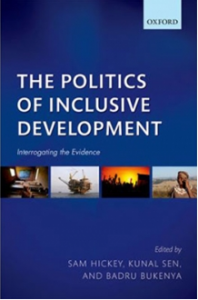New book chapter in “The Politics of Inclusive Development”
 Bebbington recently contributed a chapter on natural resources and inclusive development to a new book published by Oxford University Press, The Politics of Inclusive Development: Interrogating the Evidence. Edited by Sam Hickey, Kunal Sen, and Badru Bukenyu, the book is dedicated to the memory of the late Adrian Leftwich, founding Director of Research of the Development Leadership Program (DLP).
Bebbington recently contributed a chapter on natural resources and inclusive development to a new book published by Oxford University Press, The Politics of Inclusive Development: Interrogating the Evidence. Edited by Sam Hickey, Kunal Sen, and Badru Bukenyu, the book is dedicated to the memory of the late Adrian Leftwich, founding Director of Research of the Development Leadership Program (DLP).
The book is the first major academic collection from the Effective States and Inclusive Development Research Centre (ESID). It is made up of a large number of studies that demonstrate why politics and institutions matter in development and the delivery of growth and services.
The studies show that the universal prescriptions of the original new institutionalism – democracy, decentralisation, strengthening the demand side, and so on – are double-edged and may weaken rather than strengthen development outcomes. They attempt to identify a typology of political conditions that may be able to generate type-specific findings to stand alongside case-specific conclusions.
Bebbington’s chapter, entitled, “Governing Natural Resources for Inclusive Development,” addresses institutional and political relationships that influence the interactions between natural resource extraction, economy, and society with a focus on the mining and hydrocarbon sectors. These relationships help define the implications of resource extraction for democracy and the qualities of growth, and thus the chapter explores the conditions under which they are likely to be reproduced or changed, and the ways in which they might mediate the interactions between extraction and inclusion.
Bebbington grounds this framework in two perspectives. The first draws on a more general literature dealing with political settlements, contentious politics and the politics of ideas, placing particular emphasis on the role of social mobilization and political coalitions in processes of institutional change. The second engages with the relationships of scale, space, and time that characterize the natural resource sector.
These questions of space and time are especially important in influencing how the growth of an extractive economy influences the relationships between growth, redistribution, and the politics of recognition. Bebbington asserts that any effort to understand the governance of extraction and of its relationships to development must be spatially and historically explicit. In light of these arguments the paper closes with a discussion of the conditions that might favour the emergence of institutional arrangements under which resource extraction is more likely to foster inclusive development.